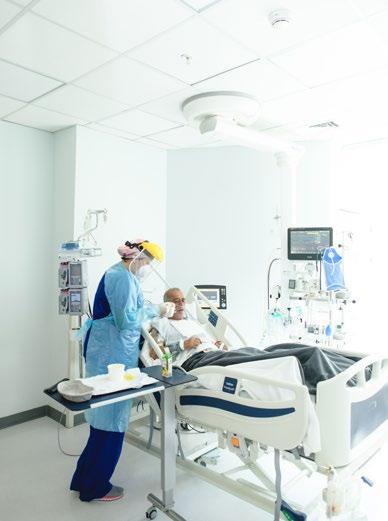Bearing witness to a pandemic BUPA | SANITAS
florence nightingale
More contemporary than ever
16
Florence was an expert at presenting data in a visual way to get across her message and secure funding. Such was her contribution to statistics that she was recognised by the bestowal of membership of the Royal Statistical Society - the first woman to gain this honour.
Florence Nightingale is considered to be the mother of modern nursing, as creator of the first conceptual model of nursing with an intersectorial, interdisciplinary and global vision. Florence was born on 12 May 1820 to English parents. 2020, the bicentenary of her birth, was declared by the World Health Organisation (who) to be the International Year of the Nurse and the Midwife. In the same year of such recognition, the world has seen and suffered the worst pandemic in the last few decades. In this time of crisis, the strength and capacity for action of nurses, pioneered by Florence Nightingale, has been put to the test at a global level. Nurses all over the world have had to find solutions to daily problems. Their observation, organisation, forward-thinking, personal and data analysis skills have been crucial in the fight against Covid. Florence Nightingale, who was from an aristocratic English family, believed that knowledge and statistical methods and instruments were key to developing concrete solutions to problems. From a young age, she showed an interest in maths, but her mother encouraged her to develop skills in the home and her father asked her to study subjects that were “more appropriate for a woman.” But Florence was persistent, and her parents ended up allowing her to study arithmetic, geometry and algebra. Florence was an expert at presenting data in a visual way to get across her message and secure funding. Such was her contribution to statistics that she was recognised by the bestowal of membership of the Royal Statistical Society - the first woman to gain this honour. She was even made an Honorary Member of the American Statistical Association. As someone with very modern ideas for the time she lived in, Nightingale had to fight against prejudice to work as a nurse, administrator, researcher, writer and teacher. She visited hospitals in many countries, such as: France, Greece, Switzerland and Egypt. These trips were her formative years. What she learnt and experienced is recorded in her travel journals and other writings. To achieve her dream of caring for the sick, she had to come up against her family, who were opposed to their daughter, a member of the aristocracy, carrying out such a “menial” task as nursing. They saw her future as getting married and bringing up a family. Surprisingly however, her life took another twist when her maternal grandmother and a doctor friend of the family gave her financial support to start her studies.
17






















































